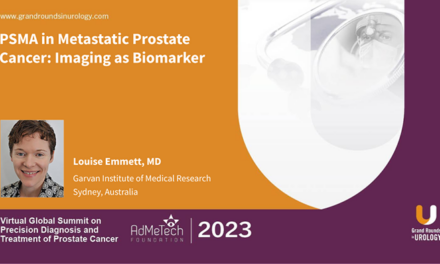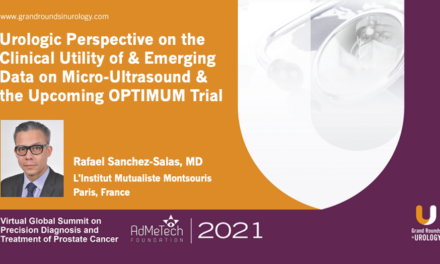Martin Eklund, PhD presented “Artificial Intelligence for Improving Prostate Cancer Diagnosis and Treatment” during the 7th Global Summit on Precision Diagnosis and Treatment of Prostate Cancer on September 21, 2023.
How to cite: Eklund, Martin. “Artificial Intelligence for Improving Prostate Cancer Diagnosis and Treatment.” September 21, 2023. Accessed Aug 2025. https://grandroundsinurology.com/artificial-intelligence-for-improving-prostate-cancer-diagnosis-and-treatment/
Artificial Intelligence for Improving Prostate Cancer Diagnosis and Treatment – Summary
In this 10-minute video, Martin Eklund, PhD, Professor in the Department of Medical Epidemiology and Biostatistics at the Karolinska Institutet in Stockholm, Sweden, describes the integration of artificial intelligence (AI) into every stage of prostate cancer care.
Traditionally and in the modern era, the process of prostate cancer (PCa) care has followed the path of prostate-specific antigen (PSA) testing leading to biopsy, then pathology, and finally management and treatment. However, every step along this path has opportunities for improvement. PSA testing has poor sensitivity and specificity, and prostate biopsy (especially standard systematic biopsy) often detects indolent cancers, among other insufficient operating characteristics. Pathology assessments have a high operator variability and are burdened with scarce resources. There is a lack of predictive biomarkers to guide treatment decisions, and overall, subjective assessments provide the basis for management and treatment.
To address these shortcomings and better individualize care delivery, there has been a wealth of research focused on developing risk-prediction and artificial intelligence (AI) models. The 2015 Stockholm3 (STHLM3) study introduced a diagnostic model to identify high-risk PCa that performed significantly better than PSA testing alone and suggested it could reduce unnecessary biopsies. Then, a 2021 trial used the STHLM3 test to risk-stratify patients before moving to MRI-targeted biopsy, proving to be an improved prostate screening method over traditional methods. The Global Summit on Precision Diagnosis and Treatment of Prostate Cancer is a unique multi-disciplinary forum organized to inform the key health care stakeholders about the emerging advances in clinical case and research and create a consensus-based vision for the future of precision care and educational and research strategy for its realization. The mission of the Summit is to fill the currently existing gap between the key experts of in vivo imaging, the world authorities in the in vitro fluid- and tissue-based molecular diagnostics, including genomics, and thought leaders in the development of novel observation strategies (e.g., active surveillance, or AS) and therapeutic interventions.
ABOUT THE AUTHOR
Martin Eklund, PhD, is the Professor of Epidemiology at the Department of Medical Epidemiology and Biostatistics at Karolinska Institutet in Stockholm, Sweden. He earned his doctorate degree in 2010 from Uppsala University in Uppsala, Sweden with a study focus on computer intensive methods for statistical model choice and validation. Between his graduation and his appointment at Karolinska Institute in 2015, he served in the Section for Global Safety Assessment at AstraZeneca and the Department of Surgery, University of California San Francisco.
His research in combining machine learning, artificial intelligence (AI), and statistical risk-prediction models with clinical practice has contributed greatly to the world of prostate and breast cancer care. In collaboration with international teams, he has worked on the innovative Stockholm3, Stockholm3-MRI, ProBio, and PANDA Challenge trials, among others. He aims, with studying prediction models and AI, to shorten innovation cycles in medicine and enable individualized, effective diagnostics and treatment.





